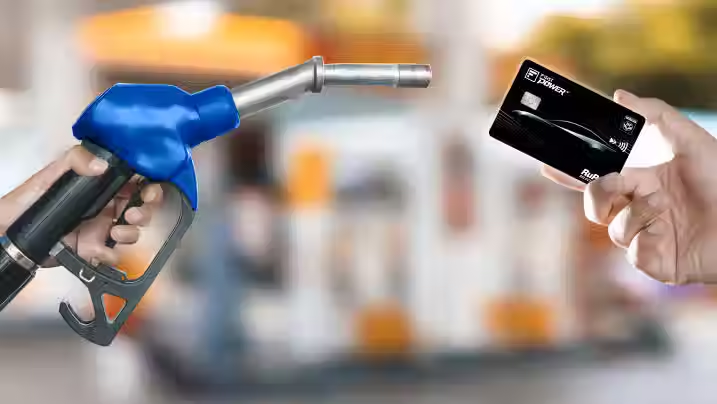Credit Cards for Poor Credit Scores
- Mudra K
- Nov 7, 2024
- 7 min read
Updated: Apr 2
#credit_card #credit_score | Read More: Credit Card Blogs | Credit Score Blogs
A low credit score can make it difficult to obtain a number of financial products, including credit cards. In India, where credit is an essential part of daily financial transactions, many people with low credit scores struggle to get credit cards. There are credit cards for people with bad credit that can help rebuild their credit and improve their financial situation.
This blog post will provide an overview of credit cards for poor credit, including their functions, benefits, eligibility requirements, and top recommendations for Indian users. If you have had trouble getting a credit card because of your poor credit, this guide will help you navigate this financial roadblock.
Credit Cards for Low Credit Scores?
Individuals with a low credit score (typically below 600 in India) or no credit history can confidently apply for credit cards designed for bad credit. These cards often have more flexible eligibility criteria, enabling those with poor credit to secure credit and start rebuilding their financial status.

Credit Cards for Poor Credit Scores
When navigating the financial landscape, individuals with poor credit scores often face significant challenges, particularly when it comes to obtaining credit cards. However, there are options available that can help these individuals manage their finances more effectively and work towards improving their credit standing. There are two major types of credit cards specifically designed for people with bad credit:
Secured Credit Cards: Secured credit cards are a practical solution for individuals looking to rebuild their credit. These cards require a security deposit, which typically serves as your credit limit. For instance, if you deposit ₹20,000 with the issuing bank, your credit limit is likely to be the same amount, allowing you to make purchases up to that limit. The security deposit acts as a safeguard for the lender, reducing their risk. This arrangement makes it easier for individuals with poor credit histories to qualify for a card. Moreover, by using a secured credit card responsibly—such as making timely payments and keeping balances low—cardholders can gradually improve their credit scores. Over time, many issuers will review account activity and may eventually transition the secured card to an unsecured one, returning the deposit once the cardholder has demonstrated responsible credit behavior.
Unsecured Credit Cards: In contrast to secured credit cards, unsecured credit cards do not require a deposit upfront. While they function similarly to standard credit cards, allowing users to make purchases and pay them off later, they come with certain caveats. To compensate for the higher risk associated with lending to individuals with poor credit scores, unsecured credit cards typically feature lower credit limits and higher interest rates compared to their secured counterparts. Additionally, these cards may come with various fees, such as annual fees or late payment fees, which can further impact the cardholder's financial situation. It is crucial for users of unsecured credit cards to manage their spending carefully and make payments on time to avoid falling deeper into debt and to work towards improving their credit scores.
How Do Credit Cards for Poor Credit Scores Work?
Credit cards for poor credit These credit cards function similarly to traditional credit cards, but there are a few key differences.
3.1. Secured vs. Unsecured Credit Cards
Secured Credit Cards
For those with poor credit, secured credit cards are generally the best option to start. As the name implies, the cardholder "secures" these cards by making a cash deposit. The deposit is refundable, and as long as you make timely payments, your credit score will gradually improve. Often, the cardholder uses the security deposit as collateral in case they fail to make payments.
How it works:
You deposit a fixed amount with the bank (e.g., ₹10,000 or ₹20,000).
You get a credit limit equal to your deposit.
You use the card and make regular payments.
After 6-12 months of responsible usage, your credit score may improve, and you can request an unsecured credit card or get your deposit back.
Unsecured Credit Cards
Unsecured credit cards are a type of credit card that does not require the cardholder to make a cash deposit as collateral, which distinguishes them from secured credit cards. While they offer the convenience of immediate access to credit without upfront payments, they often come with significantly higher interest rates and lower credit limits compared to their secured counterparts. This higher risk is primarily due to the absence of collateral; banks and financial institutions have no assets to claim should the borrower default on payments. Consequently, this makes unsecured credit cards a riskier option for lenders, as they are more susceptible to losses in the event of non-payment.
Despite the inherent risks associated with unsecured credit cards, they can serve as a valuable tool for individuals looking to rebuild or improve their credit scores. By using the card responsibly—making on-time payments and keeping balances low—cardholders can demonstrate their creditworthiness over time. This responsible usage not only helps in establishing a positive payment history but can also lead to an increase in credit limits and a decrease in interest rates, making them a viable option for those aiming to enhance their financial standing.
How it works:
Based on your financial profile, which includes factors such as your credit history, income level, and existing debts, we assign you a fixed credit limit without requiring a deposit. This limit is determined by assessing your ability to repay borrowed amounts and is designed to minimize risk for the lender while providing you with access to credit.
Interest is charged on any balance that you carry beyond the due date, and it's important to note that high interest rates typically apply to users with poor credit. This means that if you do not pay off your balance in full each month, you could incur significant interest charges, which can lead to a cycle of debt if not managed carefully. Understanding the terms of your interest rates is crucial to effectively using an unsecured credit card.
As you prove your ability to manage credit responsibly through consistent payments and prudent spending habits, your credit score may improve over time. Additionally, many credit card issuers periodically review your account and may offer enhanced terms, such as an increased credit limit or lower interest rates, as a reward for your responsible credit behavior. This can be particularly beneficial for individuals who are working to recover from past credit issues, as it provides an opportunity to demonstrate financial responsibility and build a more favorable credit profile.
Eligibility for Credit Cards with Poor Credit in India
In India, the eligibility for credit cards with poor credit varies depending on the bank and card issuer. While the exact requirements depend on the issuer, most institutions will look at factors such as your income, employment status, and existing debts when evaluating your application.
General Eligibility Criteria:
Low Credit Score: A score below 600, though some banks may issue credit cards with scores as low as 550.
Income Level: You’ll need to show proof of a stable income, even if it’s lower than average. Some banks allow applicants with an income of ₹10,000-₹15,000 per month to apply for secured cards.
Employment Status: You must have a full-time job or a steady source of income, whether salaried or self-employed.
Debt-to-income ratio: Lenders assess whether you can manage another financial obligation based on your existing debt-to-income ratio.
Advantages and Disadvantages of Credit Cards for Poor Credit
Before applying for a credit card for poor credit, it's important to understand both the benefits and the limitations.
Advantages:
Helps Build Credit History: Regular use and timely payments of these cards can assist with rebuilding your credit score.
Access to Emergency Funds: Credit cards provide a financial cushion in case of an emergency.
Increased Purchasing Power: A credit card increases your ability to make purchases and pay later.
Rewards: Some secured credit cards offer basic rewards programs, such as cashbacks or discounts on purchases.
Disadvantages:
High Interest Rates: Credit cards for poor credit tend to have much higher interest rates than standard cards, making it costly if the balance is not paid off in full.
Low Credit Limits: Most cards for poor credit have lower credit limits, limiting your spending capacity.
Security Deposit: For secured cards, you may need to pay a deposit upfront, which could be a financial burden.
Fees: Some cards may carry annual fees, monthly maintenance fees, and late payment penalties.
Top Credit Cards for Poor Credit Scores in India
If you’re ready to apply for a credit card to improve your financial standing, here are some of the top credit cards for poor credit in India:
1. SBI Unsecured Credit Card for Bad Credit
The SBI Unsecured Credit Card is ideal for individuals who want an unsecured card with a lower credit score. While it comes with a higher interest rate, it’s a favorable starting point for rebuilding credit.
2. HDFC Bank Regalia First Credit Card
For individuals who are looking for an entry-level, unsecured card, the HDFC Regalia First offers perks like airport lounge access and rewards for responsible card usage.
3. ICICI Bank Coral Credit Card
The ICICI Bank Coral Credit Card is another popular option for those looking to improve their credit score. It offers cashback, discounts on dining, and movie ticket bookings, making it an appealing choice for low-income applicants.
4. Axis Bank Insta Easy Credit Card (Secured)
This is an excellent option for individuals with poor credit looking for a secured credit card. You can start by depositing a minimum of ₹20,000 to get a credit limit equal to your deposit.
How to Improve Your Credit Score and Qualify for Better Cards
If you have a poor credit score and want to qualify for better credit cards in the future, here are a few steps to improve your score:
Pay Your Bills on Time: Timely payments have the most significant impact on your credit score.
Reduce existing debt: Pay off high-interest debts or loans before applying for new credit.
Keep Your Credit Utilization Low: Avoid using too much of your available credit. Aim for a utilization rate below 30%.
Avoid Multiple Credit Applications: Applying for multiple cards within a short period can negatively impact your score.
Conclusion
In conclusion, credit cards for poor credit offer a practical solution for individuals in India with low credit scores to rebuild their credit history. Whether through secured or unsecured credit cards, responsible use and timely payments can gradually improve your credit score and provide you with access to better financial products in the future.
While these cards may come with higher fees and interest rates, they provide an opportunity to develop a stronger financial future. Ensure you carefully weigh the pros and cons, choose the right card, and follow best practices for managing your credit to see your score rise.
For more detailed information on improving your credit score, you can refer to Experian India or the Reserve Bank of India.
Read More: One Credit Score Blogs













































Comments